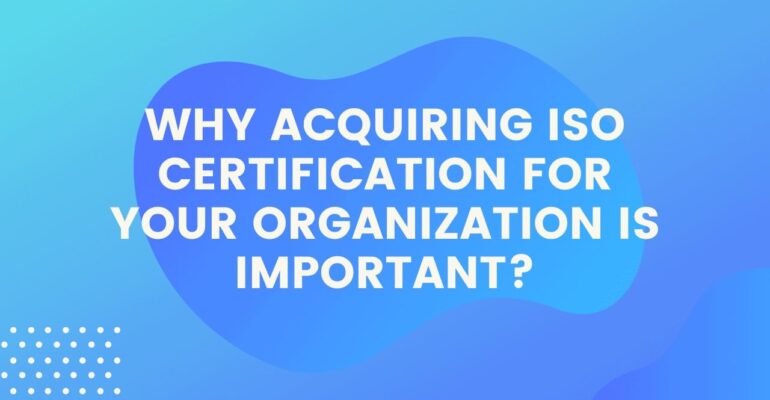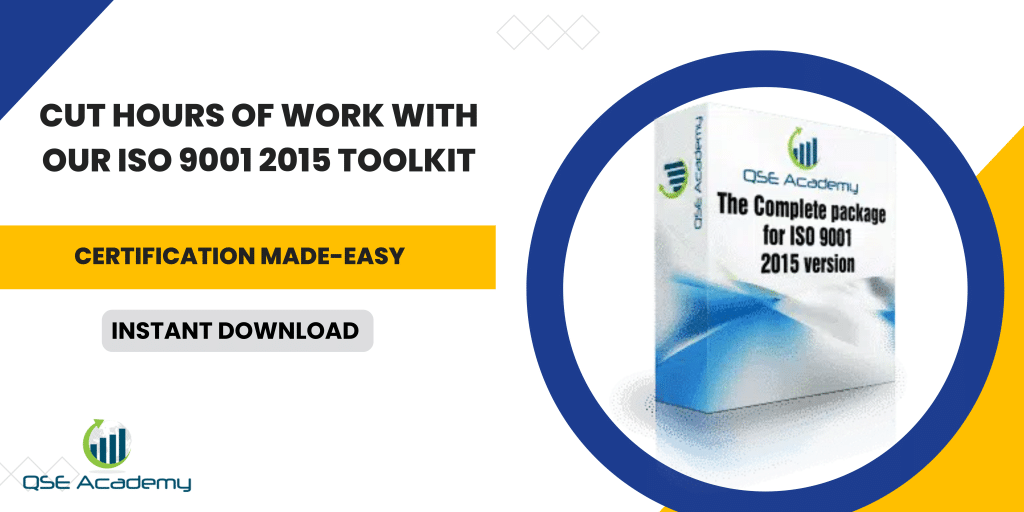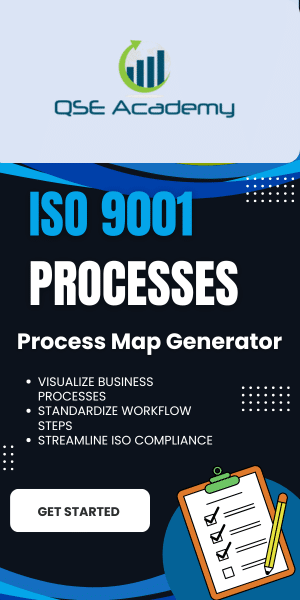ISO certification : A Smart Business Decision
Last Updated on September 24, 2025 by Melissa Lazaro
ISO certification : A Smart Business Decision
Have you ever wondered why some businesses seem to have everything perfectly under control? Their operations run like clockwork, their customers are loyal, and they seem to attract opportunities like a magnet. What’s their secret? Well, one key ingredient often lies in something called ISO certification.
Now, before you think, “That sounds too technical for me!”—relax. ISO certification isn’t as complicated as it sounds, and it’s far more valuable than most people realize. In simple terms, it’s like having an official stamp of approval that tells the world, “This business knows what it’s doing and does it well.” It’s a globally recognized standard that ensures a company’s processes are consistent, efficient, and of high quality.
Imagine walking into a café and seeing a badge on the wall that says, “Certified for Quality Service and Hygiene.” Wouldn’t you feel more confident ordering your coffee there? That’s essentially what ISO certification does—it reassures customers, partners, and even employees that your business is reliable and trustworthy.
Whether you’re running a startup or managing a multinational corporation, ISO certification can be a game-changer. It’s not just about meeting industry standards; it’s about setting yourself apart in a crowded market. Over the next few sections, we’ll dive into why ISO certification is such a smart business decision and how it can unlock doors to success.
So, grab a cup of coffee and let’s explore how this globally recognized certification can transform your business, step by step!
What is ISO Certification?
Alright, let’s get into the basics. What exactly is ISO certification, and why does it matter so much? Think of it like this: ISO certification is a way for businesses to prove they’ve got their act together. It’s a seal of approval that says, “Hey, we follow internationally recognized standards to ensure quality, safety, and efficiency in everything we do.”
Now, let’s break it down a little further. ISO stands for the International Organization for Standardization—a global body that develops standards to make sure things work the way they should. These standards cover everything from how a product is made to how a service is delivered. When a business meets these standards, they earn the prestigious ISO certification.
You might be wondering, “But what’s in it for me?” Here’s the deal: having ISO certification shows the world that your business is serious about doing things right. It signals that you care about quality, consistency, and meeting the needs of your customers. Whether you’re manufacturing parts for airplanes or running a tech support company, being ISO certified helps you stand out as a business people can trust.
For example, imagine you’re choosing between two companies to supply parts for a big project. One is ISO certified, and the other isn’t. Which one would you pick? Probably the one with the certification, because you’d feel more confident that their processes are reliable and their products meet strict quality standards.
But here’s the best part: ISO certification isn’t just about impressing your customers or partners. It’s also a powerful tool for improving your business from the inside out. It helps you identify inefficiencies, streamline your processes, and reduce waste. In other words, it’s like giving your business a professional tune-up that keeps everything running smoothly.
In the next section, we’ll dig into why getting ISO certification is one of the smartest decisions you can make for your business. Spoiler alert: it’s about more than just looking good on paper—it’s about building a stronger, more competitive company. Let’s keep going!
Why ISO Certification is a Smart Business Decision
So, why should your business bother with ISO certification? Is it really worth the time, effort, and investment? The short answer: absolutely! Let me walk you through why ISO certification is one of the smartest moves you can make for your business.
1. It Builds Credibility and Trust
Let’s start with the obvious—trust. When your business is ISO certified, it’s like putting a giant neon sign above your door that says, “You can count on us!” Customers, partners, and even suppliers instantly see you as a professional and reliable business. After all, ISO certification means your processes meet globally recognized standards, which isn’t something you achieve by accident.
Think about it: Would you rather buy a product from a random company or one that’s been certified for quality and consistency? Exactly. ISO certification makes your business stand out in a crowded market and gives people confidence in choosing you.
2. It Improves Efficiency and Reduces Waste
Here’s where ISO certification really starts to shine. The process of becoming certified requires you to take a deep dive into how your business operates. It’s like decluttering your house—you’ll identify inefficiencies, streamline your processes, and get rid of unnecessary steps that slow you down. The result? A business that runs more smoothly and saves time and money.
For example, let’s say you’re a manufacturer. During the certification process, you discover a bottleneck in production that’s costing you hours every week. Fixing that issue not only helps you meet ISO standards but also boosts your overall productivity. That’s the kind of win-win that makes ISO certification a smart investment.
3. It Opens Doors to New Opportunities
Ever dreamed of expanding into global markets? ISO certification can help make that dream a reality. Many international clients and governments require businesses to be ISO certified before they’ll even consider working with them. Think of it as a golden ticket that gets you into rooms and opportunities that were previously out of reach.
Let’s say you’re bidding on a project with a European company. They see your ISO certification and immediately know you meet the same high standards they do. That certification could be the deciding factor that lands you the deal and takes your business to the next level.
4. It Boosts Customer Satisfaction
Happy customers are the backbone of any successful business, right? Well, ISO certification helps you keep them happy by ensuring your products or services are consistent and meet their expectations. The ISO process is all about improving quality, which means fewer mistakes, better results, and more satisfied customers.
Imagine the difference it makes when your customers know they can count on you to deliver the same high-quality experience every time. That’s the kind of loyalty ISO certification helps you build.
5. It Gives You a Competitive Edge
Let’s face it: competition is fierce in just about every industry. But with ISO certification, you’ve got something that many of your competitors might not have—a globally recognized badge of excellence. It’s like having a secret weapon that sets you apart.
When customers are comparing businesses, that ISO seal can make all the difference. It’s proof that you’re serious about quality and that you’re willing to go the extra mile to ensure your business operates at the highest level.
The ISO Certification Process: What to Expect
Alright, by now, you’re probably thinking, “This all sounds great, but how does ISO certification actually work? Is it complicated?” Don’t worry—I’ve got you covered. While the process of getting ISO certification does take some effort, it’s not as overwhelming as it might seem. Let me walk you through it step by step.
Step 1: Understand the Standards You Need
The first step in the journey is figuring out which ISO standard applies to your business. There are tons of ISO standards out there, each tailored to different industries and needs. For instance:
- ISO 9001 focuses on quality management systems.
- ISO 14001 deals with environmental management.
- ISO 27001 is all about information security.
Think of it as choosing the right recipe for your business success. Once you know which standard fits your goals, you’re ready to move forward.
Step 2: Gap Analysis—Where Are You Now?
Before diving headfirst into the certification process, you’ll want to take stock of where your business stands. This step is called a gap analysis. It’s like a health check-up for your operations—identifying what you’re already doing well and what needs improvement to meet the ISO standard.
For example, if you’re aiming for ISO 9001, you might discover that your processes are great but your documentation is lacking. That’s okay! The gap analysis gives you a roadmap to focus on the areas that need attention.
Step 3: Develop and Document Processes
Once you know what gaps to address, it’s time to fine-tune your processes and document them. Documentation might sound boring, but it’s crucial for ISO certification. Think of it like writing a user manual for how your business runs—so everyone knows exactly what to do and when to do it.
The goal here is consistency. When your processes are well-documented, it’s easier for your team to follow them and for auditors to see that you’re meeting ISO standards.
Step 4: Train Your Team
Here’s an important step that often gets overlooked: making sure your team is on board. Everyone in your business needs to understand the new processes and why they matter. Training isn’t just about ticking boxes—it’s about creating a culture of quality and improvement. After all, ISO certification isn’t just a one-time achievement; it’s an ongoing commitment.
Step 5: Internal Audit
Before the official certification audit, you’ll conduct an internal audit to make sure everything is in place. Think of this as a dress rehearsal. It’s your chance to catch any issues and make adjustments before the big day. Internal audits are also a great way to build confidence that you’re ready for the next step.
Step 6: The Certification Audit
This is the moment you’ve been preparing for—the official certification audit. An external auditor will visit your business to assess whether your processes meet the ISO standard you’re aiming for. It might sound nerve-wracking, but if you’ve done the prep work, you’ll be just fine. Auditors aren’t there to trip you up; they’re there to help you succeed.
Step 7: Celebrate Your ISO Certification!
Once you pass the audit, congratulations—you’re officially ISO certified! You’ll receive a certificate that you can proudly display to show the world that your business meets international standards. But remember, ISO certification isn’t the end of the journey. It’s a commitment to maintaining and improving your processes over time.
Common Myths About ISO Certification
Let’s be real: when you hear the term ISO certification, a few misconceptions might pop into your head. Maybe you’ve heard it’s only for big corporations, or maybe you think it’s too expensive or complicated for your business. Well, let’s take a moment to clear the air and tackle some of the most common myths about ISO certification. Trust me, you’ll feel a lot better about it once we set the record straight!
Myth 1: “ISO Certification is Only for Big Companies”
This is probably the most common misconception. A lot of people assume that ISO certification is something only massive corporations can achieve. But the truth is, businesses of all sizes can benefit from it. Whether you’re running a small family business or a growing startup, ISO standards are designed to be flexible and scalable.
Think about it: smaller businesses often have limited resources, which makes it even more important to have efficient systems in place. ISO certification helps you streamline your processes and improve quality—giving you the tools to compete with even the biggest players in your industry.
Myth 2: “It’s Too Expensive”
Okay, let’s talk money. Yes, there’s a cost to getting ISO certification, but think of it as an investment rather than an expense. The improvements you’ll make during the process—like reducing waste, cutting inefficiencies, and boosting customer satisfaction—often lead to significant savings and increased revenue in the long run.
For example, imagine you’re a manufacturer, and your ISO journey helps you identify a recurring issue in your production line. Fixing that issue could save you thousands of dollars over time. So, while there’s an upfront cost, the benefits far outweigh it.
And remember, you can choose how to approach the certification process based on your budget. Some businesses hire consultants, while others manage it in-house with the help of online resources. Either way, ISO certification is more accessible than you might think.
Myth 3: “The Process is Too Complicated”
I get it—hearing words like “audit” and “standards” might make you feel overwhelmed. But here’s the thing: the process of getting ISO certification isn’t as scary as it sounds. It’s just about making sure your business runs smoothly and consistently. If you break it down into manageable steps (like we did earlier), it’s totally doable.
Plus, there’s plenty of support available to guide you through it. From consultants to training programs, you don’t have to figure it all out on your own. And once you’ve gone through the process, you’ll likely find that your business is stronger and more organized than ever before.
Myth 4: “It’s Just a Marketing Gimmick”
Let’s address this head-on: ISO certification is not just a fancy label to impress customers. Yes, it does boost your credibility, but it’s so much more than that. The certification process forces you to take a close look at your operations, identify areas for improvement, and implement better practices. It’s about building a strong foundation for long-term success.
For instance, an ISO-certified business doesn’t just claim to deliver high-quality products—it actually has the systems in place to ensure consistency and reliability. That’s why so many industries and governments require ISO certification as a baseline for doing business. It’s a badge of trust, backed by real substance.
Myth 5: “Once You’re Certified, You’re Done”
This one’s a bit tricky. While it’s true that earning your ISO certification is a big milestone, it’s not the end of the journey. Maintaining your certification means committing to continuous improvement. Regular audits will ensure you’re sticking to the standards and adapting to any changes in your business or industry.
But don’t let that intimidate you! Think of it as a way to keep your business sharp and competitive. Staying certified means you’re always striving for better, which is a mindset that leads to long-term growth and success.
Real-Life Success Stories: How ISO Certification Transforms Businesses
So, we’ve talked about what ISO certification is, why it’s valuable, and even busted a few myths. But let’s make it real—how does ISO certification actually change the game for businesses? To bring it to life, let me share a few success stories that show just how powerful this certification can be.
A Small Business Grows Big: The Manufacturing Company Success
Meet Sarah, the owner of a small manufacturing company. For years, she struggled to land contracts with bigger clients because her business didn’t have the credentials they were looking for. After a bit of research, Sarah realized that ISO certification, specifically ISO 9001 for quality management, could be the key to opening new doors.
The process wasn’t as overwhelming as she expected. By documenting her workflows and fixing inefficiencies, her team became more organized, and they started catching issues early—before they became costly mistakes. When Sarah’s business earned its ISO certification, she noticed an immediate difference. Larger clients, who previously wouldn’t even consider her company, started reaching out. Within a year, her revenue had doubled, and her small company was competing with much bigger players in the industry.
Breaking into Global Markets: The Tech Firm Advantage
Then there’s James, the founder of a growing tech firm that specializes in data security. James wanted to expand into international markets but kept hitting roadblocks—especially with European clients who required ISO 27001, the standard for information security.
James decided to go all-in on ISO certification. His team worked together to create a system that protected sensitive client data, and the certification audit helped them fine-tune their practices even further. Once certified, his company became a trusted name in the tech industry. Suddenly, James wasn’t just competing in his local market—he was landing contracts with international clients, significantly boosting his company’s credibility and revenue.
Improved Customer Satisfaction: The Hospitality Story
Let’s not forget about Maria, who owns a boutique hotel chain. She noticed that while her hotels had great reviews, there were occasional complaints about inconsistent service. Wanting to ensure every guest had the same amazing experience, she pursued ISO 9001 certification for quality management.
During the process, Maria’s team identified areas where they could improve, like standardizing staff training and streamlining communication between departments. Once they implemented these changes, the guest experience improved dramatically. And guess what? Their ISO certification became a selling point, especially for business travelers looking for consistency. Positive reviews skyrocketed, and Maria’s hotels became the top choice in their region.
Saving Time and Money: The Logistics Company Turnaround
Finally, let’s talk about Alex, who runs a logistics company. His business was constantly dealing with delays and lost shipments, which frustrated customers and cost him money. Alex decided to pursue ISO 14001, the standard for environmental management, to improve his operations and reduce waste.
As part of the certification process, Alex’s team revamped their supply chain and introduced better tracking systems. Not only did this reduce their environmental impact, but it also saved them significant amounts of time and money. By the time they achieved their ISO certification, the company was running more smoothly than ever. Clients took notice of the improvements, and Alex’s business grew rapidly.
The Common Thread: Why ISO Certification Works
What do all these stories have in common? In each case, ISO certification was the catalyst for positive change. It helped these businesses identify weaknesses, improve processes, and build trust with their customers. Whether it was landing bigger contracts, expanding globally, improving customer satisfaction, or saving money, ISO certification opened doors and created opportunities.
How to Get Started with ISO Certification
So, you’re sold on the idea of ISO certification, but now you might be asking yourself, “Where do I even begin?” Don’t worry—it’s not as daunting as it sounds. Getting started with ISO certification is all about taking one step at a time. Let me break it down for you.
Step 1: Choose the Right ISO Standard
First things first, you need to figure out which ISO standard is the best fit for your business. Each standard focuses on a specific area, so it depends on your goals and the industry you’re in.
Here are some of the most popular ones:
- ISO 9001: For quality management systems. Perfect if you want to improve consistency and customer satisfaction.
- ISO 14001: Focuses on environmental management. Great if you’re looking to reduce your environmental impact.
- ISO 27001: Deals with information security. Essential for businesses handling sensitive data.
Think about what matters most to your business right now. Are you looking to improve customer trust, streamline operations, or expand into new markets? Your answer will point you to the right standard.
Step 2: Understand the Requirements
Once you’ve chosen a standard, it’s time to dive into the details. Each ISO standard comes with a set of requirements that your business needs to meet. Don’t panic—these requirements aren’t there to overwhelm you; they’re there to guide you.
Take some time to read the standard and understand what’s expected. If it feels a bit technical, that’s okay! Many businesses find it helpful to work with an ISO consultant or take an online course to break things down into manageable steps.
Step 3: Conduct a Gap Analysis
Here’s where the real work begins. A gap analysis is like taking an honest look in the mirror. It helps you identify where your business already meets the standard’s requirements and where you need to improve.
For example, if you’re going for ISO 9001, a gap analysis might reveal that your processes are strong but your documentation needs work. Knowing this upfront gives you a clear roadmap for what to tackle.
Step 4: Build Your Systems and Document Them
Now it’s time to roll up your sleeves and start making changes. This might involve refining your processes, introducing new tools, or creating policies that align with the ISO standard. Documentation is key here—it’s not just about what you do but also about proving how you do it.
For example, if your goal is ISO certification for quality management, you’ll need to document things like customer feedback procedures, employee training processes, and quality control steps. It might sound like a lot, but it’s all about creating a system that works for your business.
Step 5: Train Your Team
Your team is the heart of your business, so it’s important to get them on board. Everyone needs to understand the new systems and why they matter. This isn’t just about ticking boxes—it’s about building a culture of quality and improvement.
Hold workshops, share guides, and encourage open communication. The more engaged your team is, the smoother the certification process will be.
Step 6: Conduct Internal Audits
Before the big day—your certification audit—you’ll want to do some practice runs. Internal audits help you spot any weak points and make improvements before the official assessment. Think of it as a dress rehearsal for your ISO certification.
Many businesses find this step empowering because it shows how far they’ve come. Plus, it builds confidence for the final audit.
Step 7: Schedule the Certification Audit
Once you’re ready, it’s time to bring in an external auditor. This is the person who will assess whether your business meets the ISO standard. While it might sound intimidating, remember that the auditor’s goal is to help you succeed, not to trip you up.
If you’ve done the preparation, you’re already ahead of the game. The audit will involve reviewing your documentation, inspecting your processes, and chatting with your team. Once you pass, you’ll officially earn your ISO certification!
Step 8: Celebrate and Maintain Your Certification
Congratulations! You’re now ISO certified, and that’s no small achievement. Take a moment to celebrate with your team—you’ve earned it. But remember, certification isn’t a one-time event. You’ll need to maintain your standards and undergo periodic audits to keep your certification valid.
The good news? By this point, maintaining your ISO certification will feel like second nature. You’ll have systems in place that make ongoing improvement a seamless part of your business.
ISO Certification: A Smart Choice for a Smarter Future
We’ve covered a lot about ISO certification—what it is, why it’s valuable, how it works, and even some inspiring success stories. But let’s bring it all together and answer the big question: Why is ISO certification a smart business decision?
The answer lies in its ability to transform your business in ways you might not have imagined. Let’s recap why pursuing ISO certification is one of the best choices you can make for your company’s future.
It Builds Trust and Credibility
One of the biggest benefits of ISO certification is that it tells the world your business is reliable, professional, and committed to quality. Whether you’re trying to win over new customers, attract investors, or secure partnerships, having an ISO-certified badge of trust makes all the difference. In a world where reputation is everything, this credibility gives you a significant edge.
It Drives Efficiency and Growth
During the certification process, you’ll analyze your operations and uncover ways to improve. Maybe it’s streamlining workflows, reducing waste, or improving communication within your team. These changes aren’t just about meeting standards—they’re about building a business that runs smoothly and efficiently. And as a result, ISO certification helps your company save time, cut costs, and grow sustainably.
It Opens Doors to New Opportunities
Whether you’re looking to expand into international markets or bid on high-profile contracts, ISO certification can be your golden ticket. Many industries and clients require businesses to be ISO certified before they’ll even consider working with them. With this certification, you’re not just meeting these expectations—you’re positioning yourself as a top-tier choice.
It Improves Customer Satisfaction
Happy customers are the lifeblood of any business, and ISO certification helps you keep them coming back for more. By implementing standardized processes and focusing on quality, you’ll consistently deliver products or services that meet—or even exceed—customer expectations. And as word spreads about your reliability, your reputation will only continue to grow.
It Future-Proofs Your Business
The business world is constantly evolving, and staying competitive requires adaptability. ISO certification isn’t just about where your business is today—it’s about where it’s headed. By embracing a culture of continuous improvement, you’re setting your company up for long-term success. You’ll be ready to adapt to changes, overcome challenges, and seize new opportunities as they come your way.
Your Next Steps Toward ISO Certification
If all of this has you thinking, “I need to get started on ISO certification right away!”—that’s fantastic. The first step is simple: decide which ISO standard aligns with your business goals, and start planning your journey. Remember, the process might take time and effort, but the rewards are well worth it.
And don’t forget, you don’t have to do it alone. From consultants to training programs, there are plenty of resources available to guide you every step of the way. The key is to take that first step and keep moving forward.
Wrapping It All Up
In today’s fast-paced and competitive world, ISO certification isn’t just a “nice-to-have”—it’s a game-changer. It helps you build trust, improve efficiency, and unlock opportunities that might have previously felt out of reach. Most importantly, it’s an investment in your business’s future.
So, whether you’re a small business looking to grow or an established company aiming to stay ahead of the curve, ISO certification is a smart choice that pays off in countless ways. Ready to take the leap? Your smarter, stronger, and more successful future is waiting for you!
Ready to move from ISO 9001 theory to implementation?
Get the exact tools you need to write your documentation, train your team, map your processes, and pass your audit—without wasted time or guesswork.

make ISO standards less intimidating and more approachable for everyone.
Whether it’s ISO 9001, ISO 22000, or the cosmetics-focused ISO 22716, I’ve spent my career
turning complex jargon into clear, actionable steps that businesses can actually use.
I’m not here to call myself an expert—I prefer “enthusiast” because I truly love what I do.
There’s something incredibly rewarding about helping people navigate food safety and quality management systems
in a way that feels simple, practical, and even enjoyable.
When I’m not writing about standards, you’ll probably find me playing Piano 🎹, connecting with people, or diving into my next big project💫.
I’m an engineer specialized in the food and agricultural industry
I have a Master’s in QHSE management and over 12 years of experience as a Quality Manager
I’ve helped more than 15 companies implement ISO 9001, ISO 22000, ISO 22716, GMP, and other standards
My clients include food producers, cosmetics manufacturers, laboratories, and service companies
I believe quality systems should be simple, useful, and efficient.











